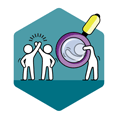Leading in a Bilingual Country

Audience
Open to public and third sector staff in Wales - Approaching senior leadership and Senior leadership
Duration
4 sessions
January to March 2026
Location
Blended learning, mix of virtual events and in-person events
Cost
Nothing at all
Information
Applications are now closed.
Who's organising it?
It’s organised and delivered by Academi Wales, the Welsh Government’s Cymraeg 2050 division and Health Department, and our facilitation partner, HICO.
Overview
We’ve got big ambitions for our language, and our Leading in a Bilingual Country (LIBC) programme is just one of our plans to realise them. Get together with us and fellow leaders to explore and experiment with how we can develop a culture of bilingualism in our organisations. You don’t need to be able to speak Cymraeg to join us: all we need is an inquisitive mindset, enthusiasm and a can-do attitude. Our ideal outcome is that we’ll all champion an organisational leadership culture in which the Cymraeg can flourish (You can read more about our ambitions for our language in our Cymraeg 2050 strategy).
As an influential leader, you’ll be part of a learning community that wants to increase the use of Welsh in our organisations so that a truly bilingual culture can thrive.
Our bilingual journey
We’re all on a bilingual journey, as organisations and individuals. And we’re all at different stages of that different journey at different times. Some of us will be just starting out, some will have travelled further. This learning community will be a place where we can learn from each other wherever we’re at.
There’ll be some pre course work for you to do, and to bring with you to the first session. This will likely be in the form of a baseline assessment which will help us tailor further sessions and discussions, so we all get something valuable to take back to our organisations. This will help us have a clear idea of what your starting point is for work you can do in your organisations to develop the leadership culture around bilingualism.
As One Welsh Public Service, we have a shared purpose and shared drivers to achieve a better and lasting quality of life for us all.
Benefits
You’ll learn about the latest Cymraeg-related developments but this is far more than a one-way information flow. We’ll also explore everyone’s ideas, experiences and hopes around Welsh-English bilingualism and leadership. In our discussions together, we’ll bring to life what benefits and potential challenges may arise as we develop the leadership culture around bilingualism in our organisations.
LIBC will present real life bilingual situations and it will focus on:
- How we can use and/or develop our leadership behaviours to ‘set the tone’ and to show dedication to a positive culture around Cymraeg in our organisations.
- It will examine the personal leadership qualities that will help us to communicate effectively in a Welsh-English environment, whatever our level of Cymraeg.
- Together, we’ll look at practical ideas for ensuring how to ‘do’ Cymraeg 2050 in our organisations and be part of our national ambition to increase the use of our language.
What won’t it cover?
- LIBC won’t provide training in, or interpretation of, any aspect of compliance with Welsh language regulations or law.
- It won’t focus on teaching or learning Welsh in organisations.
- It won’t teach you Welsh either!
Leadership behaviours
This learning programme will help you to develop your leadership behaviours in the following areas:

Learning and self-awareness

Focusing on citizens and quality

Championing innovation and change
Target audience
Open to public and third sector staff in Wales:
- Approaching senior leadership - professionals with leadership responsibilities, and are approaching senior leadership (typically with 5 or more years’ leadership experience)
- Senior leadership - senior / top-tier leaders and executives, such as Chief Executives and Directors
Please note
Leading in a Bilingual Country (LIBC) is aimed at senior leaders in the public and third sectors in executive and non-executive roles. While Welsh language officers play a crucial role in promoting the use of Welsh within their organisations, LIBC is, as a general principle, designed specifically for senior leaders. Their participation in LIBC will foster an organisational culture that is as receptive as possible to the work of Welsh language officers.
By attending LIBC, senior leaders will be equipped to lead their organisations in a way that supports and enhances the Welsh language culture of a given organisation, benefiting everyone involved. Additionally, the programme provides participants with the skills, confidence, and understanding needed to lead effectively in a bilingual environment.
Cost
Nothing at all.
How to apply
Please note that this is a competitive application process, not a registration process. Applications will be reviewed and consideration given to the leadership level in your organisation and the ability to influence the organisational culture.
As part of your application form you will be asked to provide the name and contact details for your senior leader sponsor. A senior sponsor is required to apply for this programme. You will be asked to confirm that your senior leader will attend a one hour briefing call online on 8th of January at 2pm. Applications without the support of a senior leader won’t be accepted.
The closing date for applications is 28 November 2025.
Information
Applications are now closed.
Programme dates
How much time will it take?
There are two full day events when we will meet in person and two sessions in between when we meet via MS Teams.
There will be some additional material to read or actions to take between sessions. These have been designed with busy schedules in mind
15 January 2026 (all day) Session 1: Where are we all at with bilingualism and Cymraeg?
In person, whole day.
- Getting to know each other
- Sharing where we're at
- You and Cymraeg, and your organisation and Cymraeg: past experiences of and aspirations for our language
- Explore unconscious bias and empathy in relation to English<>Cymraeg bilingualism
- The type of language we use when we speak and write about bilingualism
Learning into action: work between sessions.
9 February 2026 (10:00 to 13:00) Session 2: Building the narrative and building a team
Online with breaks.
- Putting previous learning into action
- Building the narrative: diagnosing what we need to change
- Bilingualism in practice (our story)
- What else do we need to know more about?
- Developing ambassadors within your organisation
Learning into action: work between sessions.
26 February 2026 (10:00 to 13:00) Session 3: How will it feel when we get to 2050?
Online, with breaks.
- Tying bilingualism into our own organisational values and vision
- Bilingualism in practice (our story)
- Build on strengths/address challenges raised in last session
Learning into action: work between sessions.
19 March 2026 (all day) Session 4: What next?
In person, whole day.
- Talking the talk about bilingualism – how’s it going?
- Helpful tools and takeaways for everyday bilingualism
- How individuals and organisations experience bilingualism
 Featured resources
Featured resourcesFind related learning resources
 Contact us
Contact usLeadership Development
 LinkedIn
LinkedInFollow us at Academi Wales
#OneWelshPublicService

